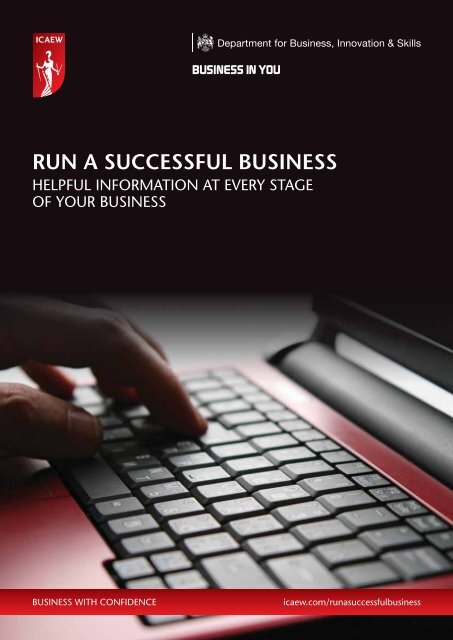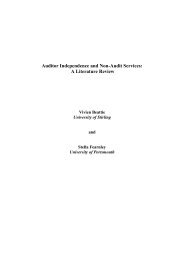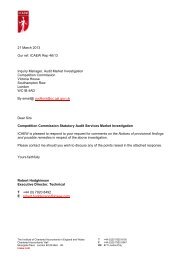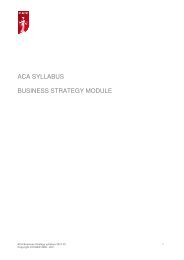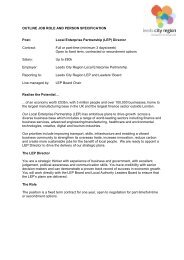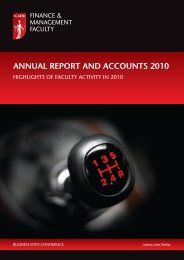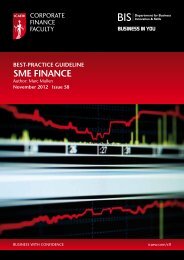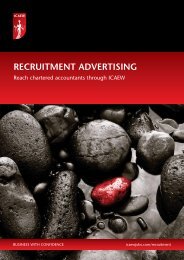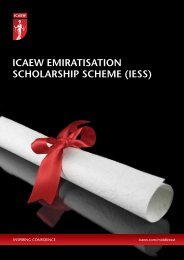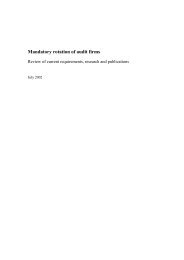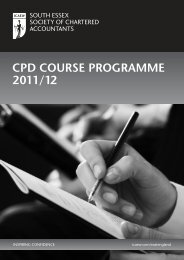RUN A SUCCESSFUL BUSINESS - ICAEW
RUN A SUCCESSFUL BUSINESS - ICAEW
RUN A SUCCESSFUL BUSINESS - ICAEW
Create successful ePaper yourself
Turn your PDF publications into a flip-book with our unique Google optimized e-Paper software.
<strong>RUN</strong> A <strong>SUCCESSFUL</strong> <strong>BUSINESS</strong><br />
HELPFUL INFORMATION AT EVERY STAGE<br />
OF YOUR <strong>BUSINESS</strong><br />
<strong>BUSINESS</strong> WITH CONFIDENCE<br />
icaew.com/runasuccessfulbusiness
<strong>RUN</strong> A <strong>SUCCESSFUL</strong> <strong>BUSINESS</strong><br />
© <strong>ICAEW</strong> 2013<br />
Dissemination of the contents of<br />
this paper is encouraged. Please give<br />
full acknowledgement of the source<br />
when reproducing extracts in other<br />
published works.<br />
No responsibility for any person acting<br />
or refraining to act as a result of any<br />
material in this paper can be accepted<br />
by The Institute of Chartered<br />
Accountants in England and Wales.<br />
ISBN: 13 978-1-84152-617-1
STEP 1<br />
PREPARING FOR <strong>BUSINESS</strong><br />
Running your own business can be an<br />
immensely rewarding experience.<br />
Every year approximately 400,000 new<br />
businesses start up in the UK.<br />
Decisions taken in the early years<br />
can be the most difficult as well as<br />
the most important, particularly for<br />
first time entrepreneurs and those<br />
with no previous business knowledge<br />
or experience.<br />
This booklet examines the challenges<br />
involved in setting up a business: the<br />
issues that you need to resolve before<br />
starting up and the questions you<br />
need to answer in order to make<br />
those crucial first steps and then grow<br />
your business with confidence.<br />
1. WILL MY <strong>BUSINESS</strong> SUPPORT ME?<br />
The business should provide you with a satisfactory<br />
income in exchange for the time that you put into it, or<br />
it will not be worth doing. There are ways of stacking<br />
the odds in your favour.<br />
Wherever practical, you can reduce risk by beginning on<br />
a part-time basis. For example, if you are thinking of<br />
opening a shop, try hiring a stall in a market first. This<br />
gives you an opportunity to test your idea: how well<br />
does the product sell? Is it priced correctly?<br />
Can it be improved?<br />
Researching your business proposition will help improve<br />
your chance of success. It will also give you a better<br />
understanding of your target market and anticipated<br />
demand. This not only helps shape the decision to go<br />
ahead but can also clarify issues such as where to locate<br />
premises, how much to spend on promotion and<br />
particularly, how much start-up finance will be required.<br />
Before starting work on a full-time basis, you need to be<br />
as certain as you can be that the business will generate<br />
enough profit to provide a living for you and any<br />
dependants. This should usually involve preparing a<br />
business plan, an approach that not only helps clarify<br />
your own thinking but will also form the platform from<br />
which you can convince others (such as the bank) that<br />
your business has a future.<br />
2. WHAT <strong>BUSINESS</strong> FORMAT SHOULD I ADOPT?<br />
There are four main options available to you:<br />
SOLE TRADER<br />
Setting up in business on your own is the most popular<br />
choice. It gives you total control of the business and<br />
the least administrative burdens, but has implications<br />
for tax and raising finance. A big disadvantage of being<br />
a sole trader is that you have unlimited liability and<br />
could therefore risk personal loss if something were to<br />
go seriously wrong.<br />
PARTNERSHIP<br />
If two or more people run a business together as<br />
partners, they share profits, losses and unlimited legal<br />
liability. It is a common and often very successful<br />
formula for business success, but even close relatives or<br />
the best of friends can fall out over money matters.<br />
That is why it is essential to define the rights and<br />
responsibilities of partners and to set them out in<br />
a partnership deed before you start the business so<br />
everyone concerned knows exactly where they stand.<br />
The partnership deed should help establish the amount<br />
of capital to be introduced, the division<br />
of profits, the calculation of individual tax liabilities, and<br />
the adjustments necessary when a partner joins or<br />
leaves the firm. Such issues are complex and need<br />
special accountancy and legal skills.<br />
LIMITED COMPANY<br />
A limited company is a legal entity separate from its<br />
owners. One advantage of this format is its continuity.<br />
Ownership can be changed or extra capital raised<br />
through the selling of shares, without necessarily<br />
affecting the management of the company. And if the<br />
business grows, the company structure can easily<br />
accommodate the expansion.<br />
There are, however, a significant number of government<br />
statutes and regulations covering the operations of<br />
companies and these can add substantially to the time<br />
and money spent on administration. What is more, the<br />
theoretical advantage of limited liability is partly offset<br />
by the common banking practice of requiring personal<br />
<strong>RUN</strong> A <strong>SUCCESSFUL</strong> <strong>BUSINESS</strong><br />
03
guarantees to cover loans to small limited companies.<br />
In short, the costs and benefits of operating a business<br />
as a company need careful analysis.<br />
LIMITED LIABILITY PARTNERSHIPS (LLP)<br />
An LLP is a corporate entity. Unlike in a standard<br />
partnership, the liability of the partners in an LLP is<br />
normally limited to the amount of their partnership<br />
commitments. Requirements regarding accounts,<br />
audit (small company audit exemption applies),<br />
returns to Companies House, winding up and<br />
insolvency, all follow normal company law rules,<br />
but taxation follows the rules for partnerships.<br />
3. DO I NEED TO RAISE FINANCE?<br />
If you have enough of your own capital, convincing<br />
others to invest in your business is not an issue.<br />
However, when seeking a bank overdraft or loan,<br />
applying for certain types of government aid, or when<br />
trying to attract new investors or partners, you will<br />
need to present a convincing picture of your business’<br />
financial condition and future prospects.<br />
An <strong>ICAEW</strong> Chartered Accountant will know exactly<br />
what information is required and how it should be<br />
presented to give you the best chance of success.<br />
GOVERNMENT ASSISTANCE<br />
The government and the EU may provide financial<br />
assistance in some circumstances. This may take the<br />
form of cash grants, tax concessions, funding of training<br />
or relocation, subsidised rents and so on. Assistance<br />
schemes vary from year to year, from industry to<br />
industry and from region to region, with most assistance<br />
being concentrated in areas of high unemployment.<br />
OTHER SOURCES OF FINANCE<br />
Other possible sources of finance available to a business<br />
owner range from debenture loans to venture capital<br />
provided under, for example, the Enterprise Investment<br />
Scheme or Regional Venture Capital Funds.<br />
Alternatively, it may be possible to arrange finance from<br />
a merchant bank, some other financial institution or<br />
perhaps a research institution. Through your own and<br />
your adviser’s contacts, you may find new investors to<br />
increase the share capital.<br />
PRESENTING INFORMATION<br />
Regardless of which sources of finance or support you<br />
intend to approach, you will need to present<br />
a convincing picture of your business’ financial<br />
condition and future prospects. An <strong>ICAEW</strong> Chartered<br />
Accountant will know what information is required and<br />
how it should be presented.<br />
YOUR OWN MONEY OR THAT OF FRIENDS<br />
AND FAMILY?<br />
Personal funding of a new business may come from<br />
personal savings, money released from the sale of other<br />
assets or from re-mortgaging your home. Asking for<br />
finance from your friends and family may be a sensitive<br />
issue that can test your relationships, but people who<br />
know you personally may be more supportive,<br />
particularly if they have also run a business. It is<br />
advisable to draw up a written loan agreement which<br />
should set out how, for example, you intend to repay<br />
them. This makes it clear that their funding is a business<br />
investment and not a favour.<br />
BANK LOANS AND OVERDRAFTS<br />
An overdraft may often be a good way to finance<br />
a temporary or fluctuating cash shortage. Where a<br />
longer-term commitment is involved, a bank loan can<br />
be the easiest and most suitable form of finance.<br />
04<br />
icaew.com/runasuccessfulbusiness
STEP 2<br />
STARTING UP YOUR <strong>BUSINESS</strong><br />
Now you are prepared:<br />
you have spoken to the right people<br />
and obtained the best advice you can.<br />
The next questions that you have to<br />
consider are:<br />
1. WHO DO I NEED TO NOTIFY?<br />
If you have chosen to be a sole trader you must notify<br />
HM Revenue and Customs (HMRC) as soon as you start<br />
in business.<br />
Businesses which reach the threshold for compulsory<br />
VAT registration (this threshold is revised every<br />
tax year) must notify HMRC. However, it can be<br />
advantageous to register even if you are below the<br />
threshold. To register for VAT you must notify HMRC.<br />
Depending upon the nature of your business and<br />
whether you are operating from a business premises,<br />
there may be other bodies you should notify, such as<br />
your local authority.<br />
If you create a limited company, you must notify<br />
Companies House, who will then notify HMRC. HMRC<br />
will send you a form that you must complete and return<br />
within three months of issue.<br />
2. WHAT DO I NEED TO THINK ABOUT<br />
IF I AM BUYING A <strong>BUSINESS</strong>?<br />
Sometimes an entire business or its assets can be<br />
acquired as a going concern. One of the main<br />
challenges of buying a business is agreeing the amount<br />
that is to be paid and on what terms, as there is rarely a<br />
market comparison available. An <strong>ICAEW</strong> Chartered<br />
Accountant can help to assess the value and can also<br />
also help you to negotiate the deal.<br />
3. WHAT ACCOUNTING RECORDS ARE REQUIRED?<br />
Every business registered for VAT is required to maintain<br />
financial records according to the guidelines given by<br />
HMRC.<br />
Similarly, it is a requirement of the Companies Act that<br />
every company should keep proper accounting records<br />
of money received and paid, of all sales and purchases,<br />
and of assets and liabilities.<br />
HMRC requires every business which employs staff to<br />
keep proper records for Pay As You Earn (PAYE) and for<br />
the calculation of tax liabilities. From October 2013 all<br />
employers' payrolls will be linked to HMRC using Real<br />
Time Information. In some types of business, there are<br />
additional records that have to be kept to satisfy<br />
government requirements.<br />
If your records are inadequate in any of these areas, you<br />
could fall foul of the law. Your <strong>ICAEW</strong> Chartered<br />
Accountant is there to make sure that this does not<br />
happen.<br />
4. HOW DO I MONITOR THE PROGRESS OF<br />
MY <strong>BUSINESS</strong>?<br />
IDENTIFY PROFIT AND LOSS<br />
Many businesses do not have adequate systems for<br />
identifying the amounts of profit or loss generated by<br />
different products and services, or even by the business<br />
as a whole, yet this information is absolutely essential if<br />
the business is to grow stronger.<br />
It is also important to know the costs of different areas<br />
of administration, so that overheads are not allowed to<br />
swallow the profits made from gross margins.<br />
To keep track of where profits and costs are coming<br />
from, you may need to have a properly designed<br />
management information system which can provide all<br />
the essential facts quickly and accurately.<br />
OBTAIN TIMELY INFORMATION<br />
Annual accounts are not enough to control a business.<br />
You must know what is happening to profits and losses<br />
on a much more regular basis. Most businesses need to<br />
produce operating statements at quarterly intervals at<br />
least and, better still, at monthly intervals. There are<br />
even some businesses where financial information is<br />
available in real time.<br />
<strong>RUN</strong> A <strong>SUCCESSFUL</strong> <strong>BUSINESS</strong> 05
SET FINANCIAL OBJECTIVES<br />
Businesses need to plan ahead and compare forecast<br />
figures with actual results. Break-even analysis, business<br />
ratios, budgets and discounted cash flow, perhaps built<br />
into a financial model on a computer, are some of the<br />
methods which can be used to set realistic financial<br />
targets and then keep you on course to achieve them.<br />
An <strong>ICAEW</strong> Chartered Accountant is qualified to advise<br />
you on the most appropriate systems for you to use and<br />
which methods to adopt.<br />
5. SHOULD I USE ACCOUNTING SOFTWARE?<br />
Almost certainly. If you already have a computer, using<br />
accounting software to run the accounting and<br />
management information systems can make such a big<br />
difference to your business. They provide fast and<br />
detailed information. They save you time and time is<br />
your money.<br />
There is now a wide selection of small computers and<br />
standard accounting software which do not cost too<br />
much. It is important, however, to obtain independent<br />
professional advice on the suitability of a system for<br />
your particular business and to ensure that proper<br />
controls are provided.<br />
• Your insurance companies: your contents insurance<br />
will probably need to specify any business assets such<br />
as computing equipment etc, to ensure they are<br />
covered.<br />
• The bank/building society (if you have a mortgage):<br />
this is usually a formality but it is advisable in case<br />
there is a potential breach of the mortgage<br />
agreement.<br />
7. WHAT HAPPENS IF I USE MY OWN VEHICLE?<br />
That all depends on the business format you have<br />
chosen. As a sole trader or in a partnership you<br />
can bring a private vehicle into the business right from<br />
the start. But if you do, it is important to keep all your<br />
receipts for petrol, repairs, insurance etc. For tax<br />
purposes you are also required to keep a record of<br />
mileage to calculate the allowable business share of the<br />
running costs.<br />
For limited companies, it is less advisable to bring<br />
a private vehicle into the company because of the<br />
HMRC’s ‘benefit in kind’ regulations which assess the<br />
benefit derived from the personal use of a company car<br />
together with the fuel benefit.<br />
Talk to your <strong>ICAEW</strong> Chartered Accountant to see if it is<br />
worth your while.<br />
6. CAN I START MY <strong>BUSINESS</strong> BY WORKING<br />
FROM HOME?<br />
Working from home requires considerable self-discipline<br />
and will not suit everybody. However, it is an excellent<br />
way of starting a new venture when the business<br />
proposition allows, particularly because you will incur<br />
lower overheads during the critical stage of establishing<br />
the business.<br />
It will also allow you to claim a percentage of your<br />
property’s running costs as an office. However,<br />
there is a danger that, if HMRC considers the claim<br />
excessive, it might launch an inquiry that could result in<br />
disallowed costs and an increased tax bill. There is also<br />
the possibility of a capital gains tax liability when the<br />
property is eventually sold.<br />
If you do decide to work from home, consider notifying<br />
these organisations:<br />
• Your local authority: there may be a case for paying<br />
business rates but it is unlikely if the local authority<br />
decides that there has been no material change in<br />
the use of the house (from residential use).<br />
06<br />
icaew.com/runasuccessfulbusiness
STEP 3<br />
GROWING YOUR <strong>BUSINESS</strong><br />
1. WHAT ARE THE ISSUES FOR FINANCING A<br />
GROWING <strong>BUSINESS</strong>?<br />
The way a business is financed can have an important<br />
effect on profitability, especially when interest rates are<br />
likely to change. It may be possible to reduce interest<br />
payments on loans or overdrafts by more efficient use of<br />
cash, better stock control, improved buying terms, etc.<br />
An expanding business means increasing turnover and<br />
consequent increases in debtors (amounts owed to<br />
the business). Growing businesses often need to<br />
improve their credit control, making efforts to ensure<br />
their customers pay promptly and do not default on<br />
their debts.<br />
A great number of other financial issues may require<br />
consideration: should new capital equipment be leased<br />
or purchased? Should money be raised by share capital,<br />
loans or overdraft? What are the tax implications? What<br />
is the correct gearing level (the relationship between<br />
the capital contributed by the owners and the amount<br />
of money borrowed) for a business? If there is spare<br />
cash, can it be invested temporarily? Where will the<br />
cash get the best return while still being accessible if<br />
needed? All these considerations affect working capital<br />
requirements, the cost of financing the business and, of<br />
course, profits.<br />
The main sources of finance for growing businesses<br />
include:<br />
INVOICE DISCOUNTING<br />
Invoice discounting makes cash available to you from<br />
an invoice discounting firm on receipt of a debtor’s<br />
invoice. You are still responsible for collecting payment<br />
from the debtor. Such a facility is suitable for<br />
partnerships and limited companies selling goods<br />
or services on credit to other businesses and is a<br />
cost-effective alternative to overdrafts and bank loans.<br />
FACTORING<br />
In a similar manner to invoice discounting, a factor<br />
will buy your trade debts and pay you as soon as they<br />
receive a valid invoice. The factor directly collects the<br />
debt from your customer but will usually agree<br />
collection policies with you. Invoice factors and<br />
discounters advance around 80-90% of your invoice<br />
value, although the figure does depend on your<br />
industry sector, turnover, customer base and existing<br />
credit controls.<br />
ASSET FINANCE<br />
This is a secured business loan under which a financial<br />
institution lends you money using your assets as<br />
collateral. Ownership of the assets is retained by the<br />
lender for the duration of the contract. Such lenders<br />
prefer to deal with manufacturers, distributors and<br />
retailers who possess assets with a high recoverable<br />
value and a measurable residual value at the end of the<br />
borrowing period.<br />
EQUITY FINANCE<br />
As your business grows it might exhaust its borrowing<br />
abilities. Alternatively, your plans may involve incurring<br />
expenditure which will not result in the acquisition of<br />
tangible assets against which to raise finance – such as<br />
research and development or significant marketing<br />
expenditure. In these cases raising equity finance may<br />
be a solution.<br />
<strong>BUSINESS</strong> ANGELS<br />
A business angel is an individual who may invest in your<br />
business in return for a stake in your company. They are<br />
most attracted to those businesses offering a good<br />
return. Business angels will also want a seat on the<br />
board and to receive regular updates on the company’s<br />
progress, so you will have to be prepared to relinquish<br />
some control.<br />
VENTURE CAPITAL<br />
Venture capitalists tend not to fund start-ups but do<br />
provide finance for growing businesses in exchange for<br />
a significant stake in the company. As professional<br />
investors, they can bring significant financial and<br />
management expertise which might make it easier to<br />
attract further funding. Because venture capitalists rarely<br />
make investments below £2m, they will need to be<br />
convinced that your business has the potential for<br />
sustained growth and that you have a sound<br />
management team to move the business forward.<br />
NEW ONLINE SOURCES OF FUNDING<br />
The internet offers the opportunity for smaller<br />
businesses to access finance:<br />
• Debt funding<br />
• Equity finance<br />
• Working capital funding – factoring & invoice<br />
discounting.<br />
<strong>RUN</strong> A <strong>SUCCESSFUL</strong> <strong>BUSINESS</strong> 07
A number of sites seek to match businesses looking for<br />
finance with individuals and businesses looking for<br />
diversification of risk and yield. The business models<br />
vary, so it is vital to understand how the risk of the<br />
proposition has been assessed. The cost is often<br />
proportionately higher than bank finance but the risk is<br />
often greater.<br />
5. HOW WILL ANNUAL ACCOUNTS HELP ME?<br />
They will enable you to buy goods or services on credit.<br />
If you have a limited company you will be filing annual<br />
accounts at the Registrar of Companies. HMRC will<br />
require accounts to support the tax returns. Credit<br />
reference agencies also need financial information<br />
before you can buy on credit.<br />
2. WHAT DO I NEED TO CONSIDER WHEN<br />
EMPLOYING STAFF?<br />
Growing a business usually means taking on more<br />
employees and with them comes a lot of new<br />
paperwork and responsibility. Can you be sure that you<br />
are correctly interpreting the legislation on the national<br />
minimum wage, working time directive, maternity<br />
leave, stakeholder pensions, etc? At this stage many<br />
businesses opt to use a payroll bureau to calculate<br />
employee wages, deductions for PAYE, and national<br />
insurance. From October 2013 all employers' payrolls<br />
will be linked to HMRC using Real Time Information.<br />
P11Ds must be completed every year.<br />
3. SHOULD I CHANGE THE <strong>BUSINESS</strong> STRUCTURE?<br />
Possibly. Most expanding businesses decide to become<br />
a limited company. This makes it easier to give minority<br />
interests to new shareholders, as well as offering limited<br />
liability so that the owners are not subject to the risks of<br />
bankruptcy. It also allows a division between the<br />
business owners (now called shareholders) and the<br />
management (now directors). If the business has<br />
‘outside shareholders’, they will probably want the<br />
annual accounts to be audited. Finance providers may<br />
also prefer the assurance that an audit brings, to protect<br />
their investment.<br />
6. WHAT ARE THE KEY CONSIDERATIONS WHEN<br />
LOOKING FOR <strong>BUSINESS</strong> PREMISES?<br />
It pays to be flexible when looking for business premises<br />
and practical too. Don’t ignore any of these points.<br />
• Location: is it convenient for you and your customers?<br />
• Parking: is there enough space for staff and<br />
customers? What are the parking costs?<br />
• Local transport facilities: how will everybody<br />
get there?<br />
• Are there shopping facilities nearby for staff?<br />
• Access: does it meet the requirements of the<br />
Disability Discrimination Act?<br />
• Terms of lease: how important is stability,<br />
or is flexibility more important?<br />
• Availability of services: reception, kitchen, toilets,<br />
cabling for computers, etc.<br />
• Size of accommodation: will furniture and<br />
equipment fit? Is there room for expansion?<br />
• Crime: does the area have a high crime rate?<br />
It could affect your insurance.<br />
• Image: will the premises enhance the business image<br />
with existing or new customers?<br />
• Would serviced accommodation be a better solution?<br />
4. WHAT MANAGEMENT INFORMATION MIGHT<br />
I NEED?<br />
Any business that is on the up needs timely information<br />
about its financial performance. And if yours has<br />
external funding, the financial providers will demand<br />
regular information on profitability and cash flow to<br />
enable them to assess the risks that their finance is<br />
under. Quarterly, or sometimes even monthly, accounts<br />
are the minimum expected by finance providers.<br />
Shareholders not involved in the day-to-day running<br />
of the business will also want information about<br />
performance.<br />
08<br />
icaew.com/runasuccessfulbusiness
THE LAST STEP – EXITING A <strong>BUSINESS</strong><br />
Many small business owners regard<br />
their business as their pension so, at<br />
some stage, they will consider selling<br />
the business to fund their retirement.<br />
These owners then become involved in a careful<br />
balancing act. On the one hand, they want to maintain<br />
their income from the business but, on the other, they<br />
need to dispose of the business while at its peak earning<br />
capacity in order to gain the best price.<br />
1. WHEN DO I THINK ABOUT SELLING MY <strong>BUSINESS</strong>?<br />
Maximising the price from the sale of a business<br />
requires considerable planning. The preparation of the<br />
business for the sale can be a long process. In the<br />
meantime you, as the owner, need to be careful not to<br />
take your eye off the business ball.<br />
Poorer performance could result in a reduction in the<br />
perceived value of the business from the prospective<br />
buyer’s viewpoint. Most probably you will need outside<br />
help in arriving at a valuation, putting together a sale<br />
prospectus and conducting the sale process.<br />
2. HOW WILL SELLING AFFECT MY STAFF?<br />
A common way for an owner to exit a business is to<br />
sell it to the remaining staff. You would need to ensure<br />
they have adequate management skills and then groom<br />
them for their roles.<br />
The raising of finance for a ‘management buyout’ may<br />
involve complicated loan arrangements between the<br />
company and the new shareholders. The tax<br />
considerations can also be complex, as both seller and<br />
buyer will want to maximise their tax benefits.<br />
An <strong>ICAEW</strong> Chartered Accountant is well placed to help<br />
you resolve these issues and advise you of the pitfalls.<br />
3. HOW DO I ENSURE AN ADEQUATE PENSION?<br />
You will need to set aside sufficient money from<br />
business profits to yield an adequate future pension.<br />
Saving out of earnings to set aside a pension is usually<br />
highly tax-efficient and could give you the opportunity<br />
for future investment.<br />
<strong>RUN</strong> A <strong>SUCCESSFUL</strong> <strong>BUSINESS</strong> 09
A CLEAR PERSPECTIVE ON TAX<br />
1. QUESTIONS ABOUT <strong>BUSINESS</strong> TAXATION<br />
IS TIMING IMPORTANT WHEN SETTING UP<br />
A <strong>BUSINESS</strong>?<br />
If you intend to start on your own or in partnership and<br />
not through a limited company, then definitely. The<br />
dates chosen for starting or ending a business and for its<br />
accounting year end can make a big difference to your<br />
tax position and cash flow. The timing of important<br />
transactions or purchases of capital equipment can also<br />
have a significant effect. It often pays to take expert<br />
advice before committing yourself to a decision on<br />
timing, as you may be able either to save tax or delay<br />
the payment of tax.<br />
WHAT IS TAX DEDUCTIBLE?<br />
Most of the expenses of running a business are tax<br />
deductible but there are exceptions. The capital cost of<br />
most business assets is allowable, although the<br />
deductions are usually spread over a period of years.<br />
You need to ensure that all legally available tax<br />
allowances have been claimed and also try to achieve<br />
maximum benefit by careful timing of your capital<br />
allowance claims.<br />
SHOULD I PURCHASE OR LEASE?<br />
That depends on your taxation and financial position.<br />
But you are absolutely right to consider such<br />
implications when investing in equipment, buying a car,<br />
or undertaking any other major expenditure. The<br />
options are outlined in step 1. The tax treatment will<br />
vary. Some forms of finance have an immediate cash<br />
flow effect, whereas others result in a tax benefit in<br />
12–18 months time.<br />
SHOULD I DO THE <strong>BUSINESS</strong>’ TAX RETURN?<br />
Completing tax returns can be complicated and time<br />
consuming and mistakes may give rise to an enquiry<br />
from HMRC, and ultimately a penalty. Unless your<br />
business is very small it is advisable to use the services of<br />
an expert who is experienced in dealing with a wide<br />
range of tax returns.<br />
WHICH ITEMS ARE VATABLE?<br />
Some businesses have trouble sorting out which<br />
transactions are VATable and those that are exempt or<br />
zero-rated. There may even be problems of definition<br />
that have to be negotiated with the VAT inspector.<br />
HMRC publishes public notices to help with VAT queries.<br />
DO I NEED TO REGISTER FOR VAT?<br />
Your business must be registered for VAT if your<br />
turnover for the previous 12 months exceeds the<br />
threshold (revised every tax year). Once you register<br />
you will be given a VAT registration number and notified<br />
of the registration date from which VAT should be<br />
charged on your supplies.<br />
If your business has a turnover below the registration<br />
threshold, you can voluntarily register for VAT. This<br />
would be appropriate if your business makes purchases<br />
from suppliers and receives invoices which include VAT.<br />
If your business is not VAT registered, the VAT on these<br />
suppliers’ invoices becomes an unrecoverable cost.<br />
Voluntary registration means that it is important to<br />
consider whether your customers are VAT registered and<br />
can recover this cost themselves.<br />
Visit: www.hmrc.gov.uk<br />
WHAT SHOULD I DO BEFORE DOING <strong>BUSINESS</strong><br />
ABROAD?<br />
Trading or setting up overseas can bring complex tax<br />
problems. You will encounter a different tax regime,<br />
both on direct and indirect taxes. There may also be<br />
complications with transactions between the UK and<br />
the overseas country. To assess the tax advantages and<br />
disadvantages of overseas operations you should seek<br />
expert advice.<br />
10<br />
icaew.com/runasuccessfulbusiness
2. QUESTIONS ABOUT PERSONAL TAXATION<br />
DO I HAVE TO DO MY OWN SELF ASSESSMENT?<br />
You will be required to complete a self assessment tax<br />
return. If you are computer literate and your tax affairs<br />
are relatively straightforward, you can complete and<br />
submit the relevant documents either online or in hard<br />
copy. HMRC publishes a range of information on self<br />
assessment.<br />
HOW DO I RECLAIM TAX?<br />
If too much tax has been paid in the past, it may be<br />
reclaimed in certain circumstances. Examples of causes<br />
of overpayments include incorrect PAYE coding, the<br />
omission of allowable expenses from a tax return, or<br />
refunds because of the higher personal allowance<br />
available to pensioners.<br />
IS IT POSSIBLE TO REDUCE MY INCOME TAX?<br />
Of course. There are a large number of legitimate ways<br />
by which you can reduce your income tax liability,<br />
including ensuring that you are claiming all allowable<br />
expenses.<br />
For example, you could consider choosing different forms<br />
of borrowing or investment to improve your tax position,<br />
take advantage of the tax relief available on personal<br />
pension plans, change the timing of visits abroad, or even<br />
move abroad to achieve non-resident status.<br />
HOW DO I FIND OUT MORE ABOUT REDUCING<br />
INHERITANCE TAX?<br />
Most transfers of assets are now free from inheritance<br />
tax provided the donor survives for seven years after the<br />
transfer. However, this tax is complex and needs careful<br />
planning. Steps to reduce inheritance tax can result in<br />
increased potential liabilities to other taxes, such as<br />
capital gains tax.<br />
SHOULD I BE WORRIED ABOUT CAPITAL GAINS TAX?<br />
If a profit results from selling an asset that is not part of<br />
the trading stock of your business, you may be liable for<br />
capital gains tax (CGT). Also, if your business is run from<br />
home, the exemption from CGT that private houses<br />
normally enjoy could be prejudiced if you seek income<br />
tax relief on part of the property’s running costs.<br />
Planning in advance can help minimise a capital gains<br />
tax liability.<br />
<strong>RUN</strong> A <strong>SUCCESSFUL</strong> <strong>BUSINESS</strong> 11
BEYOND THE JARGON<br />
Although we do our best to keep<br />
technical terms to a minimum, there<br />
are times when there is little or no<br />
alternative.<br />
You may have come across a number in this guide and<br />
you will be sure to find more in tax literature or when<br />
communicating with the tax authorities. This glossary<br />
should help to explain some of the key terms that you<br />
need to be aware of.<br />
STATUTORY AUDIT<br />
Limited companies and LLPs which exceed a certain size<br />
are required to have a statutory audit of their annual<br />
accounts. Some companies with less than 50 employees<br />
are, however, eligible for exemption from a statutory<br />
audit. If their annual turnover is less than £6.5m and<br />
their balance sheet total is less than £3.26m, for<br />
accounting years ending on or after 1 October 2012<br />
the exemption applies if the company meets two out<br />
of the three criteria ie, number of employees, turnover<br />
and balance sheet total.<br />
A statutory audit must be performed by a registered<br />
auditor. The Companies Act 2006 requires that every<br />
auditor is registered with a recognised supervisory body<br />
(RSB). RSBs are responsible for laying down and<br />
enforcing rules designed to ensure that statutory audit<br />
work carried out by registered firms is conducted<br />
properly.<br />
The Institute of Chartered Accountants in England and<br />
Wales (<strong>ICAEW</strong>) is a recognised RSB and many of its<br />
member firms are registered auditors. The registered<br />
auditor, often a firm of <strong>ICAEW</strong> Chartered<br />
Accountants, examines the books and records to ensure<br />
that the annual accounts give a true and fair view of the<br />
company’s financial position and operating results.<br />
Even when the audit is not a legal requirement, many<br />
businesses may choose to have an audit because of the<br />
positive benefits it can provide in terms of reassurance<br />
and expert advice.<br />
<strong>BUSINESS</strong> PERFORMANCE MONITORING<br />
<strong>BUSINESS</strong> RATIOS<br />
There is a wide range of ratios that can be used to help<br />
understand and interpret the financial position of a<br />
business.<br />
• Profitability: is the business making more or less profit?<br />
• Balance sheet: how money invested in the business is<br />
moving between one asset class and another.<br />
• Combination of profitability and balance sheet:<br />
return on capital employed.<br />
Two particular ratios which are commonly used by new<br />
business start-ups are:<br />
• Gross margin percentage: the gross margin (sales<br />
less direct costs of sales) expressed as a percentage of<br />
the sales (also referred to as ‘turnover’).<br />
• Break-even point: the amount of sales per<br />
day/week/month required to cover the overhead<br />
costs (rent, office salaries, etc). Sales in excess of this<br />
figure mean the business is covering its costs and<br />
trading profitably.<br />
PLANS AND BUDGETS<br />
As previously implied, it is desirable to put together a<br />
business and financial plan when considering setting up<br />
a new venture. You should do this even when you do<br />
not need to raise external finance.<br />
If you are looking for external finance, a business plan is<br />
essential. It should include details of markets served by<br />
the business, history, management, future plans, etc.<br />
Similar plans will be required if the owner is considering<br />
selling the business. The plan will include a projected<br />
profit and loss account, cash flow and a balance sheet.<br />
Budgets are normally used internally to help<br />
management to run the business, monitor its progress<br />
and develop action plans to achieve objectives. Budgets<br />
usually contain the same basic information as plans ie,<br />
forecast of profitability, cash flow and financial position.<br />
However, budgets usually deal in shorter timescales and<br />
can be broken down into weekly, monthly or quarterly<br />
periods.<br />
Financial management information is compared with<br />
the budget to monitor progress and to decide if<br />
changes in planned actions are required. A comparison<br />
of financial performance figures with budget, together<br />
with key ratios, is often a primary source of information<br />
for the effective running of a business.<br />
12<br />
icaew.com/runasuccessfulbusiness
CHOOSING A CHARTERED ACCOUNTANT<br />
Whether you’re considering setting up<br />
on your own, growing your already<br />
successful business, or even selling it,<br />
an <strong>ICAEW</strong> Chartered Accountant can<br />
be your best business ally.<br />
1. WHY CAN YOU RELY ON US?<br />
PROPER TRAINING<br />
Almost anyone can legally call themselves an<br />
‘accountant’. However, you have to earn the right<br />
to call yourself an ‘<strong>ICAEW</strong> Chartered Accountant’ by<br />
joining The Institute of Chartered Accountants in<br />
England and Wales.<br />
Before becoming an <strong>ICAEW</strong> Chartered Accountant<br />
and using the designatory letters ACA or FCA after their<br />
names, <strong>ICAEW</strong>’s members must:<br />
• undertake a period of at least three years training<br />
with an an authorised organisation;<br />
• pass extremely tough examinations embracing<br />
financial management, auditing, business strategy,<br />
taxation and IT; and<br />
• ensure that they keep up to date with the latest<br />
legislation on an annual basis.<br />
We demand that our members maintain high standards<br />
of ethical and professional conduct. This training and<br />
experience also ensures that <strong>ICAEW</strong> Chartered<br />
Accountants develop communication skills, business<br />
awareness and professional judgement.<br />
2. WHAT SHOULD YOU LOOK FOR?<br />
The letters ACA or FCA mean that you can be assured<br />
that you are dealing with an <strong>ICAEW</strong> Chartered<br />
Accountant.<br />
To benefit, it is important that you find a firm that is<br />
similar to yours in size, preferably with experience of<br />
your sector, and that has clients with similar needs and<br />
issues to you.<br />
Business people’s needs vary widely, from just dealing<br />
with tax and compliance, right through to proactive<br />
business advice. So it is important that your <strong>ICAEW</strong><br />
Chartered Accountant can provide the range of<br />
services and advice that is right for you. Like every<br />
professional, they specialise. So, when you are looking<br />
to appoint an <strong>ICAEW</strong> Chartered Accountant, it is best<br />
to check their individual specialisations as listed in<br />
icaewfirms.co.uk If you require audit, investment<br />
business or insolvency, check that they are authorised to<br />
undertake this work.<br />
Arrange to meet at least three <strong>ICAEW</strong> Chartered<br />
Accountants who you believe could do the job. Tell<br />
them about your business and see if they are able to<br />
help and advise you. Then choose your preferred firm,<br />
the one that you feel you will be able to work most<br />
effectively with, establish an agreed basis of payment<br />
and exactly who will be dealing with your work. Make<br />
sure you believe you can get on with the person.<br />
And, so that he or she can continue to work for<br />
you effectively, always remember to keep your <strong>ICAEW</strong><br />
Chartered Accountant informed of any changes or<br />
developments in your circumstances. It is important to<br />
review your arrangements every three to five years as<br />
you and your business might change in that time.<br />
RAISING STANDARDS<br />
All <strong>ICAEW</strong> members must undertake a programme of<br />
Continuing Professional Development; this not only<br />
demonstrates their commitment to maintaining the<br />
highest professional standards but also ensures that they<br />
are up to date with changes in legislation, regulation, etc.<br />
PROFESSIONAL ‘INSURANCE’<br />
All <strong>ICAEW</strong> members who hold a practising certificate<br />
and offer accountancy services to the public must be a<br />
part of the Practice Assurance Scheme, which<br />
underwrites our members’ professional standards.<br />
<strong>RUN</strong> A <strong>SUCCESSFUL</strong> <strong>BUSINESS</strong> 13
FIND THE RIGHT ACCOUNTANT<br />
It can be a challenge to keep on top of all the financial<br />
requirements and regulations, while you’re preparing to<br />
get your business off the ground.<br />
For any new business, it’s helpful to be able to draw on<br />
the knowledge of leading financial experts. The <strong>ICAEW</strong><br />
Business Advice Service (BAS) is an easy way to access<br />
financial guidance and reassurance on how to plan,<br />
start, manage and eventually grow your business.<br />
You can start today with a straightforward, open<br />
discussion with an <strong>ICAEW</strong> Chartered Accountant.<br />
No catch, no obligation, no time wasting and there’s no<br />
charge for the first session – just practical thinking to<br />
help your business get off to the best start. It’s an<br />
opportunity to start a relationship with a financial<br />
expert who can be really helpful during those early<br />
stages of starting up and as your business grows.<br />
One meeting and we’re sure you’ll notice the<br />
difference.<br />
There are thousands of <strong>ICAEW</strong> firms offering BAS. You<br />
can search for your local <strong>ICAEW</strong> Chartered Accountant<br />
at businessadviceservice.com<br />
E bas@icaew.com<br />
T +44 (0)20 7920 3561<br />
14
<strong>ICAEW</strong> is a founder member of the Global Accounting Alliance, which represents<br />
around 775,000 of the world’s leading professional accountants in over 165<br />
countries around the globe, to promote quality services, share information and<br />
collaborate on important international issues.<br />
<strong>ICAEW</strong> is a professional membership organisation, supporting over 138,000<br />
chartered accountants around the world. Through our technical knowledge,<br />
skills and expertise, we provide insight and leadership to the global accountancy<br />
and finance profession.<br />
Our members provide financial knowledge and guidance based on the highest<br />
professional, technical and ethical standards. We develop and support<br />
individuals, organisations and communities to help them achieve long‐term,<br />
sustainable economic value.<br />
Because of us, people can do business with confidence.<br />
<strong>ICAEW</strong><br />
Chartered Accountants’ Hall Moorgate Place London EC2R 6EA UK<br />
T +44 (0)20 7920 8100<br />
E london@icaew.com<br />
linkedin.com – find <strong>ICAEW</strong><br />
twitter.com/icaew<br />
facebook.com/icaew<br />
© <strong>ICAEW</strong> 2012 MSDPLN8451 12/12


